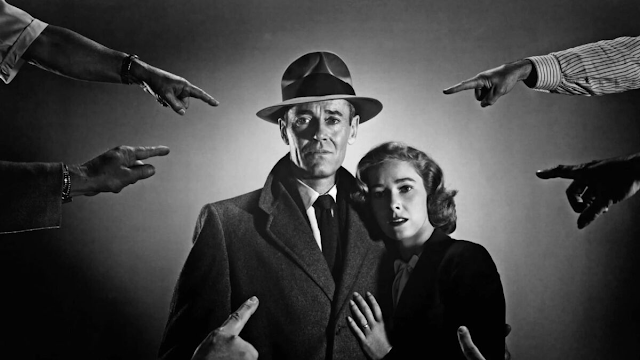The Wrong Man (1956)
Alfred Hitchcock's "The Wrong Man"
When discussing the breadth of Hitchcock's oeuvre, his 1956 film "The Wrong Man" is rarely mentioned. This is rather unfortunate, as it is a film well worth observing and discussing. It seems like Hitchcock's attempt at a noir, at a time when the noir genre had reached its natural conclusion. Two years later, Orson Welles' "Touch of Evil" would put the exclamation mark on the genre's finality. Despite being a noir-influenced film, it still has all the landmarks of a Hitchcock suspense film. In fact, you might say "The Wrong Man" is Hitchcock boiled down to his very essence.
The film stars Henry Fonda as New York City musician named Christopher. He has a wife, Rose (played by Vera Miles), and two children. Christopher and his wife are down on their luck and needing money for Rose's dental concerns. One day, Christopher goes into a life insurance company to try and get a loan on his wife's insurance. Several of the tellers mistakenly believe that he is the same man who robbed them at gunpoint a year prior. After calling it in, police show up to Christopher's home and bring him in for questioning. All the evidence seems to indicate that it was Christopher who committed the crime, from key witnesses to identical handwriting. After being booked and going to prison, Rose is able to get assistance from friends in posting his bail. The remainder of the film is spent trying to secure evidence that will prove Christopher's innocence. In the midst of this, Rose starts to lose her sanity and is placed in a mental hospital. Once Christopher's innocence is proven, he believes her sanity will be restored. That is, however, not the case, as the film ends with his life in shambles after this unfortunate case of mistaken identity.
The first half of the film plays out similarly to Franz Kafka's 1925 novel, "The Trial," minus the surrealist aspects. It really digs into the conscious fear every human being has of being falsely accused and imprisoned for something they didn't do. This is also a large aspect of Hitchcock's work, which allows him to play with tension and suspense to greater effects. When Christopher is going through the whole police interrogation and accusation process in the beginning, I felt a tightness in my chest as an audience member. I desired an imminent resolution that not only freed Christopher of any accusation, but demonstrated to the police and the suspects their fallibility. What I truly desired was a Frank Capra ending, full of gusto and heightened victory. What I received instead was something much more akin to a Fritz Lang film. We as viewers finally do get the just rewards of Christopher's patience, however, it doesn't feel victorious. It still feels like he lost. After all, his life is in shambles. This simple error in prosecuting the wrong man has absolutely destroyed his life and his marriage. The reason this is the closest Hitchcock has ever come to a noir film is due to the bleakness of the film's ending. That, and his noir-esque visual brushstrokes throughout.
Hitchcock often filmed stories involving an everyday innocent man who gets pulled form his everyday life into a world of conspiracy or being mistakenly accused of something he didn't do. This film not only showcases that, but also is simply titled "The Wrong Man." Hitchcock likes to play on the fears of his audience: that they will be going about their day and their life and suddenly encounter an issue that would disrupt their entire life. This film takes that idea and boils it down to its most simple form. Imagine you are accused of robbery and all the evidence is stacked up against you? The worst kind of fate is that of the undeserved fate. You were doing everything you were supposed to be doing and yet, life is indifferent. Because of this, "The Wrong Man" feels like Hitchcock at his most molecular level, getting to the essence of his work in a straightforward way. Much of Hitchcock's work involves conspiracy, murder plots, and other heightened plot devices to drive up the suspense and intrigue. This film, however, is perhaps his most plausible storyline. No espionage, no conspiracy, no attempted murder plots. Just a simple man accused of robbery with the evidence against his favor. "The Wrong Man" is simple and gets to the paranoia of the everyman with acute directness. It is Hitchcock at his bleakest, his simplest, and his most realistic.




Comments
Post a Comment